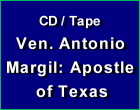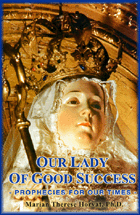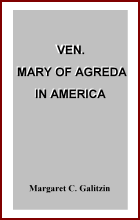American History
 |
 |
 |
 |
 |
 |
 |
Fundamental Errors of the Founding Fathers - 5
‘Rivers of Blood Must Yet Flow’:
Washington, Jefferson & the French Revolution
George Washington was a noble-minded man with the natural qualities of a leader. His personality was so captivating that his soldiers clamored for him to become King of the new nation. He, however, refused, for it was not in keeping with the principles of the "enlightened" government for which he was fighting.
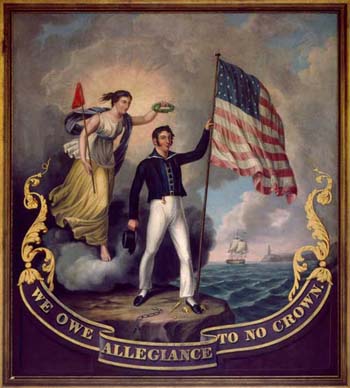 Instead, he was elected to be the first President of the United States and inaugurated on April 30, 1789, the same fateful year that marked the onset of the French Revolution. In 1793, a few years after the inauguration, President Washington, decked out in his full Masonic regalia, led a procession of Masons to the location of the United States Capitol building, where he laid the cornerstone.
Instead, he was elected to be the first President of the United States and inaugurated on April 30, 1789, the same fateful year that marked the onset of the French Revolution. In 1793, a few years after the inauguration, President Washington, decked out in his full Masonic regalia, led a procession of Masons to the location of the United States Capitol building, where he laid the cornerstone.
At the same time, in the dark days of the Reign of Terror that had been unleashed over a once happy France, his fellow Masons in Paris were accomplishing the downfall of Catholicism and Monarchy.
President George Washington, like many moderates of the time, supported the principles of the French Revolution, but did not agree with the violence used to enforce them. At its outset, however, he expressed his lively enthusiasm for the Revolution. In a letter of October 13, 1789, Washington wrote:
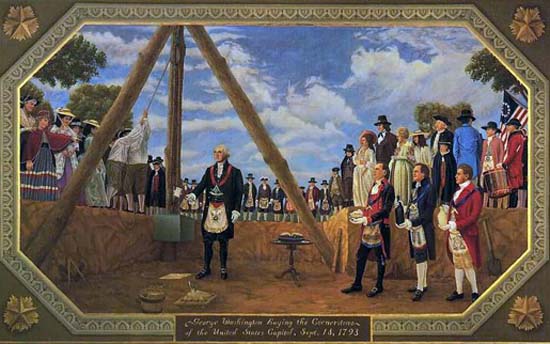 “The revolution which has been effected in France is of so wonderful a nature that the mind can hardly recognize the fact. If it ends, as our last accounts to August 1st predict, that nation will be the most powerful and happy in Europe.
“The revolution which has been effected in France is of so wonderful a nature that the mind can hardly recognize the fact. If it ends, as our last accounts to August 1st predict, that nation will be the most powerful and happy in Europe.
“But ... the mortification of the king, the intrigues of the queen and the discontent of the princes and nobles will foment divisions in the National Assembly, and they will unquestionably avail themselves of every faux pas in the formation of the constitution, if they do not give a more open, active opposition.
“Great temperance, firmness and foresight are necessary. To forbear [prevent] running from one extreme to another is no easy matter, and should this be the case. … Rocks and shelves, not visible at present, may wreck the vessel and give a higher-toned despotism than the one which existed before.” (1)
Debate over the Neutrality Proclamation
When the bloody regime of "Reason" revealed its true face, President Washington issued a Neutrality Proclamation on April 22, 1793, so that the United States might stay on friendly terms with all the European powers involved in the war that had broken out. At the time revolutionary France had declared war on Holland, England and Spain in addition to being at war with Austria and Prussia.
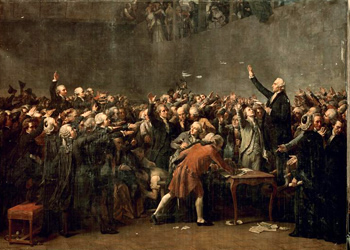 The new French minister to the United States, Edmond Genêt, arrived in Charleston S.C. on April 8, 1793, and immediately began recruiting Americans for the Republican cause in France. Although concerned that Genêt might influence the newly formed nation to enter the war, Washington and his
cabinet decided to receive him, an act that officially recognized the new Revolutionary Regime in spite of the declared neutrality. (2)
The new French minister to the United States, Edmond Genêt, arrived in Charleston S.C. on April 8, 1793, and immediately began recruiting Americans for the Republican cause in France. Although concerned that Genêt might influence the newly formed nation to enter the war, Washington and his
cabinet decided to receive him, an act that officially recognized the new Revolutionary Regime in spite of the declared neutrality. (2)
Thomas Jefferson, who initially agreed upon the neutrality statement over France, became very critical of it and his opposition grew with time. He encouraged James Madison to write letters against neutrality under the name Helivicus to counter Alexander Hamilton’s letters of Pacificus that defended Washington’s position.
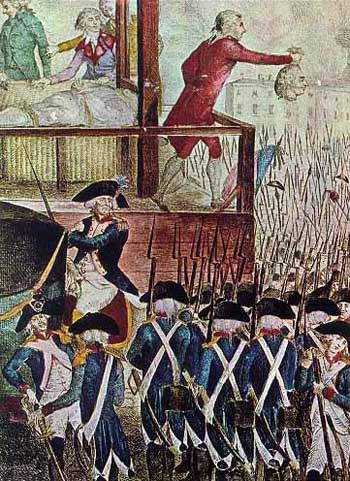 That Jefferson loved the French Revolution and even supported the radical Jacobins – although he did hold some reservations about the bloody rule of Robespierre – is clearly expressed in a letter he wrote to William Short on January 3, 1793:
That Jefferson loved the French Revolution and even supported the radical Jacobins – although he did hold some reservations about the bloody rule of Robespierre – is clearly expressed in a letter he wrote to William Short on January 3, 1793:
“The tone of your letters had for some time given me pain, on account of the extreme warmth with which they censured the proceedings of the Jacobins of France. ... In the struggle which was necessary, many guilty persons fell without the forms of trial, and with them some innocent. These I deplore as much as anybody. ...
“But I deplore them as I should have done had they fallen in battle. It was necessary to use the arm of the people, a machine not quite so blind as balls and bombs, but blind to a certain degree. ... The liberty of the whole earth was depending on the issue of the contest, and was ever such a prize won with so little innocent blood?
“My own affections have been deeply wounded by some of the martyrs to this cause, but rather than it should have failed, I would have seen half the earth desolated. Were there but an Adam and an Eve left in every country, and left free, it would be better than as it now is.
"I have expressed to you my sentiments, because they are really those of 99 in an hundred of our citizens. The universal feasts, and rejoicings which have lately been had on account of the successes of the French, showed the genuine effusions of their hearts.” (3)
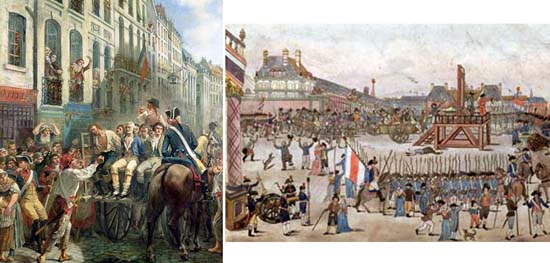 Many Americans also verbally expressed their disapproval of the neutrality stance, and French Minister Genêt endeavored to rally the people against their new President. This, however, failed when Genêt attempted to turn a British vessel into a French warship in U.S. territory, an act that violated the U.S. government’s authority and turned American sentiment against the Frenchman. (4)
Many Americans also verbally expressed their disapproval of the neutrality stance, and French Minister Genêt endeavored to rally the people against their new President. This, however, failed when Genêt attempted to turn a British vessel into a French warship in U.S. territory, an act that violated the U.S. government’s authority and turned American sentiment against the Frenchman. (4)
The Whiskey Rebellion establishes central power
Jefferson’s concern that Alexander Hamilton was influencing Washington to make America more British and monarchical continued to grow. Under his direction, democratic societies formed to oppose Washington’s policies.
These societies were dissolved in 1794 after Washington brought troops to stop the Whiskey Rebellion, an uprising of Pennsylvania settlers rebelling against the whiskey tax imposed by the federal government. Washington believed the Rebellion was instigated by those societies, who protested the federal government’s interference in State’s rights. (5)
Finally, Washington organized a militia force and marched on Western Pennsylvania, ending the Whiskey Rebellion and establishing the new government’s right to levy taxes on all the states.
In 1794, the Neutrality Proclamation was issued, which further reinforced the federal power.
Washington & Jefferson, friends of Lafayette
Although Washington took middle stances and attempted not to create division, the radical Jeffersonians would not be appeased. They followed the democratic Jefferson in his radical support of the French Revolution. It was over this important issue, among other dissensions, that Jefferson’s friendship with Washington waned. At the end of the year 1793, Jefferson resigned as Secretary of State and returned to Monticello.
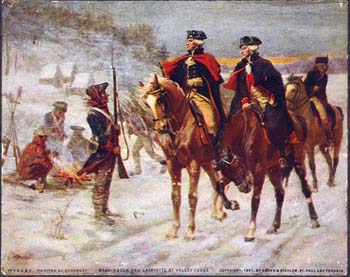
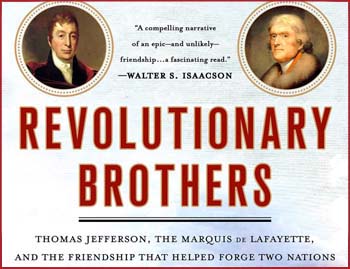 It is natural that Jefferson would be so adamant in supporting the French Revolution, because he had played a role in the making of it. It was he who had visited France many times and had helped the Marquis de Lafayette to draft The Declaration of the Rights of Man and of the Citizen, (6) although alterations were later made by the members of the National Assembly for the final document released on August 26, 1789. (7) Not without cause has the Declaration of Independence been compared to the Declaration of the Rights of Man.
It is natural that Jefferson would be so adamant in supporting the French Revolution, because he had played a role in the making of it. It was he who had visited France many times and had helped the Marquis de Lafayette to draft The Declaration of the Rights of Man and of the Citizen, (6) although alterations were later made by the members of the National Assembly for the final document released on August 26, 1789. (7) Not without cause has the Declaration of Independence been compared to the Declaration of the Rights of Man.
Lafayette, in his turn, was no stranger to America. He had come from France to fight in the American Revolution where he met General Washington, who would become a lifetime friend and whom Lafayette would address in a letter as “My beloved General, the Patriarch and Generalissimo of universal liberty.” (8)
Thomas Jefferson and other Founding Fathers likewise made his acquaintance with the Marquis de La Fayette and maintained a continued correspondence with him. On Lafayette’s return to France, he brought with him the revolutionary ideas of liberty and played a prominent role in the French Revolution, leading the conservative faction.
The King of France had indeed seriously erred when he sent soldiers to fight for the American Revolution, for the majority of them were French Freemasons intent on spreading the ideals of their Secret Society. The American Revolution effectively became the testing ground for all subsequent revolutions, as Jefferson proudly proclaimed in a letter dated June 1795 to another American politician a year after the death of Robespierre:
“I congratulate you on the successes of our two allies. Those of the Hollanders [the Dutch were at this time revolting against their government leaders] are new, and therefore pleasing. It proves there is a god in heaven, and that he will not slumber without end on the iniquities of tyrants, or would-be tyrants, as their Stadtholder [Prince William V].
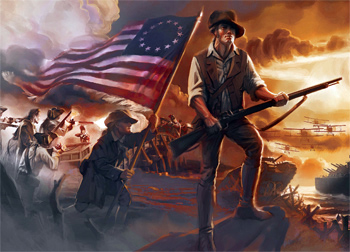 “This ball of liberty, I believe most piously, is now so well in motion that it will roll round the globe, at least the enlightened part of it, for light & liberty go together. It is our glory that we first put it into motion, & our happiness that being foremost we had no bad examples to follow. What a tremendous obstacle to the future attempts at liberty will be the atrocities of Robespierre!” (9)
“This ball of liberty, I believe most piously, is now so well in motion that it will roll round the globe, at least the enlightened part of it, for light & liberty go together. It is our glory that we first put it into motion, & our happiness that being foremost we had no bad examples to follow. What a tremendous obstacle to the future attempts at liberty will be the atrocities of Robespierre!” (9)
Although Thomas Jefferson disapproved of the reign of Robespierre as excessively brutal, to the end of his life he maintained that many people must be sacrificed in order to spread the Revolution all over the world.
Three years before his death, in a letter of September 4, 1823, Jefferson wrote to John Adams:
“The generation which commences a revolution rarely completes it. Habituated from their infancy to passive submission of body and mind to their kings and priests, they are not qualified, when called on, to think and provide for themselves, and their inexperience, their ignorance and bigotry make them instruments often, in the hands of the Bonapartes and Iturbides to defeat their own rights and purposes. ...
“The light which has been shed on mankind by the art of printing has eminently changed the condition of the world … The kings and the rabble of equal ignorance have not yet received it's rays; but it continues to spread. And, while printing is preserved, it can no more recede than the sun return on his course. A first attempt to recover the right of self-government may fail, so may a 2nd and 3rd etc.
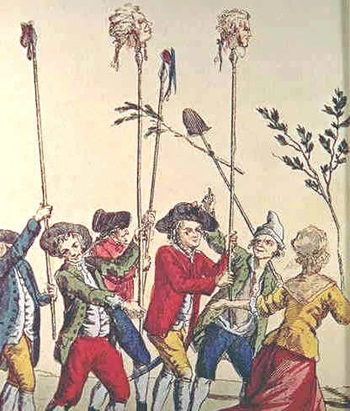 "But as a younger, and more instructed race comes on, the sentiment become more and more intuitive, and a 4th and 5th or some subsequent one of the ever renewed attempts will ultimately succeed... and all will attain representative government, more or less perfect.
"But as a younger, and more instructed race comes on, the sentiment become more and more intuitive, and a 4th and 5th or some subsequent one of the ever renewed attempts will ultimately succeed... and all will attain representative government, more or less perfect.
“This is now well understood to be a necessary check on kings, whom they will probably think it more prudent to chain and tame, than to exterminate. To attain all this, however, rivers of blood must yet flow, & years of desolation pass over, yet the object is worth rivers of blood, and years of desolation.
"For what inheritance, so valuable, can man leave to his posterity? ... You and I shall look down from another world on these glorious achievements to man, which will add to the joys even of heaven.” (10)
As Catholics, we may well wonder how much “joy” Jefferson is experiencing in the place of his just reward, from which he will have to pay to the last farthing for all of the “glorious achievements” he thrust upon nations and men in the name of Liberty, Equality and Fraternity to their ultimate ruin and decay.
To be continued


The American Revolution spread ‘Enlightenment’ principles
At the same time, in the dark days of the Reign of Terror that had been unleashed over a once happy France, his fellow Masons in Paris were accomplishing the downfall of Catholicism and Monarchy.
President George Washington, like many moderates of the time, supported the principles of the French Revolution, but did not agree with the violence used to enforce them. At its outset, however, he expressed his lively enthusiasm for the Revolution. In a letter of October 13, 1789, Washington wrote:

In full Masonic regalia George Washington lays the cornerstone for the Capitol building
“But ... the mortification of the king, the intrigues of the queen and the discontent of the princes and nobles will foment divisions in the National Assembly, and they will unquestionably avail themselves of every faux pas in the formation of the constitution, if they do not give a more open, active opposition.
“Great temperance, firmness and foresight are necessary. To forbear [prevent] running from one extreme to another is no easy matter, and should this be the case. … Rocks and shelves, not visible at present, may wreck the vessel and give a higher-toned despotism than the one which existed before.” (1)
Debate over the Neutrality Proclamation
When the bloody regime of "Reason" revealed its true face, President Washington issued a Neutrality Proclamation on April 22, 1793, so that the United States might stay on friendly terms with all the European powers involved in the war that had broken out. At the time revolutionary France had declared war on Holland, England and Spain in addition to being at war with Austria and Prussia.

Strong debate ensued in Congress
over the Neutrality Act
Thomas Jefferson, who initially agreed upon the neutrality statement over France, became very critical of it and his opposition grew with time. He encouraged James Madison to write letters against neutrality under the name Helivicus to counter Alexander Hamilton’s letters of Pacificus that defended Washington’s position.

Jefferson: ‘Was ever so great a prize won with so little innocent blood?’
“The tone of your letters had for some time given me pain, on account of the extreme warmth with which they censured the proceedings of the Jacobins of France. ... In the struggle which was necessary, many guilty persons fell without the forms of trial, and with them some innocent. These I deplore as much as anybody. ...
“But I deplore them as I should have done had they fallen in battle. It was necessary to use the arm of the people, a machine not quite so blind as balls and bombs, but blind to a certain degree. ... The liberty of the whole earth was depending on the issue of the contest, and was ever such a prize won with so little innocent blood?
“My own affections have been deeply wounded by some of the martyrs to this cause, but rather than it should have failed, I would have seen half the earth desolated. Were there but an Adam and an Eve left in every country, and left free, it would be better than as it now is.
"I have expressed to you my sentiments, because they are really those of 99 in an hundred of our citizens. The universal feasts, and rejoicings which have lately been had on account of the successes of the French, showed the genuine effusions of their hearts.” (3)

Nobles sent without trial to the guillotine,
where hundreds of thousands were slaughtered in the name of Liberty
The Whiskey Rebellion establishes central power
Jefferson’s concern that Alexander Hamilton was influencing Washington to make America more British and monarchical continued to grow. Under his direction, democratic societies formed to oppose Washington’s policies.
These societies were dissolved in 1794 after Washington brought troops to stop the Whiskey Rebellion, an uprising of Pennsylvania settlers rebelling against the whiskey tax imposed by the federal government. Washington believed the Rebellion was instigated by those societies, who protested the federal government’s interference in State’s rights. (5)
Finally, Washington organized a militia force and marched on Western Pennsylvania, ending the Whiskey Rebellion and establishing the new government’s right to levy taxes on all the states.
In 1794, the Neutrality Proclamation was issued, which further reinforced the federal power.
Washington & Jefferson, friends of Lafayette
Although Washington took middle stances and attempted not to create division, the radical Jeffersonians would not be appeased. They followed the democratic Jefferson in his radical support of the French Revolution. It was over this important issue, among other dissensions, that Jefferson’s friendship with Washington waned. At the end of the year 1793, Jefferson resigned as Secretary of State and returned to Monticello.

Washington & Lafayette at Valley Forge, below, Jefferson & Layfayette ‘brothers’ in the cause for revolution

Lafayette, in his turn, was no stranger to America. He had come from France to fight in the American Revolution where he met General Washington, who would become a lifetime friend and whom Lafayette would address in a letter as “My beloved General, the Patriarch and Generalissimo of universal liberty.” (8)
Thomas Jefferson and other Founding Fathers likewise made his acquaintance with the Marquis de La Fayette and maintained a continued correspondence with him. On Lafayette’s return to France, he brought with him the revolutionary ideas of liberty and played a prominent role in the French Revolution, leading the conservative faction.
The King of France had indeed seriously erred when he sent soldiers to fight for the American Revolution, for the majority of them were French Freemasons intent on spreading the ideals of their Secret Society. The American Revolution effectively became the testing ground for all subsequent revolutions, as Jefferson proudly proclaimed in a letter dated June 1795 to another American politician a year after the death of Robespierre:
“I congratulate you on the successes of our two allies. Those of the Hollanders [the Dutch were at this time revolting against their government leaders] are new, and therefore pleasing. It proves there is a god in heaven, and that he will not slumber without end on the iniquities of tyrants, or would-be tyrants, as their Stadtholder [Prince William V].

The American Revolution sent the ‘ball of liberty’
rolling into France
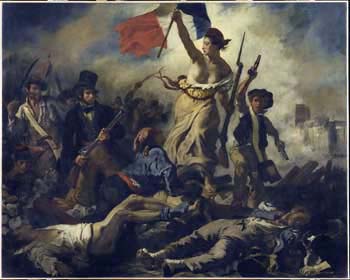
Although Thomas Jefferson disapproved of the reign of Robespierre as excessively brutal, to the end of his life he maintained that many people must be sacrificed in order to spread the Revolution all over the world.
Three years before his death, in a letter of September 4, 1823, Jefferson wrote to John Adams:
“The generation which commences a revolution rarely completes it. Habituated from their infancy to passive submission of body and mind to their kings and priests, they are not qualified, when called on, to think and provide for themselves, and their inexperience, their ignorance and bigotry make them instruments often, in the hands of the Bonapartes and Iturbides to defeat their own rights and purposes. ...
“The light which has been shed on mankind by the art of printing has eminently changed the condition of the world … The kings and the rabble of equal ignorance have not yet received it's rays; but it continues to spread. And, while printing is preserved, it can no more recede than the sun return on his course. A first attempt to recover the right of self-government may fail, so may a 2nd and 3rd etc.

‘Rivers of blood yet must flow &
years of desolation pass’
“This is now well understood to be a necessary check on kings, whom they will probably think it more prudent to chain and tame, than to exterminate. To attain all this, however, rivers of blood must yet flow, & years of desolation pass over, yet the object is worth rivers of blood, and years of desolation.
"For what inheritance, so valuable, can man leave to his posterity? ... You and I shall look down from another world on these glorious achievements to man, which will add to the joys even of heaven.” (10)
As Catholics, we may well wonder how much “joy” Jefferson is experiencing in the place of his just reward, from which he will have to pay to the last farthing for all of the “glorious achievements” he thrust upon nations and men in the name of Liberty, Equality and Fraternity to their ultimate ruin and decay.
To be continued
- https://alphahistory.com/frenchrevolution/washington-french-revolution-1789/#:~:text=%E2%80%9CThe%20revolution%20which%20has%20been,powerful%20and%20happy%20in%20Europe
- https://www.mountvernon.org/library/digitalhistory/digital-encyclopedia/article/neutrality-proclamation/
- https://founders.archives.gov/documents/Jefferson/01-25-02-0016#:~:text=These%20I%20named%20to%20you,to%20it's%20own%20republican%20principles
- In what came to be called the Citizen Genêt Affair, Washington demanded Genêt’s recall to France. However by the time the Radical Jacobins had taken power and were sending so many former ‘friends’ to the guillotine that Genêt feared for his life should he return to France. The situation was resolved when Genêt married a daughter of Gov. George Clinton of New York, a follower of Jefferson, and became a U.S. citizen.
- https://www.mountvernon.org/george-washington/the-first-president/washington-vs-jefferson/
- Lafayette consulted with Jefferson for the writing of the Rights in July 1789. Lafayette writes to his “dear friend” Jefferson: “To Morrow I present my bill of rights about the middle of the sitting. Be pleased to consider it again, and make your observations.” X. Lafayette to Jefferson, [9 July 1789] https://founders.archives.gov/documents/Jefferson/01-15-02-0232-0012
- The person most involved in the revision was a ‘Catholic’ priest Abbe Sieyes.
- Lafayette wrote to Washington on the 7th of March, 1791:
Paris, March the 7th, 1791
“Whatever expectations I had conceived of a speedy termination to our Revolutionary trouble, I still am tossed about in the ocean of factions and commotions of every kind—for it is my fate to be on each side, with equal animosity attacked ... altho’ our gr[e]at and good Revolution is, thank heaven, not only insured in France, but on the point of visiting other parts of the world, provided the restoration of public order is soon obtained in this country, where the good people have been better taught how to overthrow despotism than they can understand How to submit to the law—to you, my beloved General, the Patriarch and Generalissimo of Universal liberty, I shall render exact accounts of the conduct of your deputy and aid in this great cause.”
https://founders.archives.gov/documents/Washington/05-07-02-0293 - Letter of Thomas Jefferson to Tench Coxe. Monticello June 1. 1795. https://www.loc.gov/exhibits/jefferson/181.html
- Letter of Thomas Jefferson to John Adams. Monticello Sep. 4, 1823. https://founders.archives.gov/documents/Jefferson/98-01-02-3737#:~:text=the%20light%20which%20has%20been,but%20it%20continues%20to%20spread.

Posted September 6, 2023
______________________
______________________




